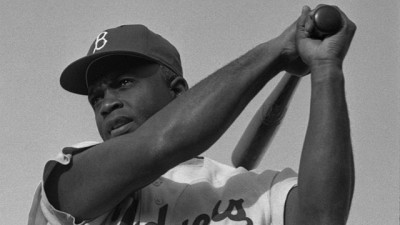Henry Louis Gates, Jr.'s
100 Amazing Facts About the Negro
Who Were the African Americans in the Kennedy Administration?
In the first six months of the Kennedy Administration, some 50 black men (and women) were appointed to executive branch jobs.Madam Walker, the First Black American Woman to Be a Self-Made Millionaire
Madam C.J. Walker, the first black millionairess in America, invented the world’s first hair-straightening formula. Continue reading
The Black Governor Who Was Almost a Senator
Why didn’t more than one black person serve in the Senate during the Reconstruction era — a condition that persisted until this year? Continue reading
Cory Booker and the First Black Senators
Iin 1870, the senators in power after the Civil War had to settle a fundamental question when it came to seating Hiram R. Revels, the first black senator-elect: Was it too soon, according to the Constitution, for any black man to be legally entitled to serve? Continue reading
’12 Years a Slave’: Trek From Slave to Screen
As a literary scholar and cultural historian who has spent a lifetime searching out African Americans’ lost, forgotten and otherwise unheralded tales, I was honored to serve as a historical consultant on Steve McQueen’s 12 Years a Slave, most certainly one of the most vivid and authentic portrayals of slavery ever captured in a feature film. Continue reading
Did MLK Improvise in the ‘Dream’ Speech?
Looking at his prepared speech at the March on Washington, Dr. Martin Luther King, Jr. balked when he reached this mouthful of a sentence: “And so today, let us go back to our communities as members of the international association for the advancement of creative dissatisfaction.” Instead, he transformed his speech into a sermon. Continue reading
Who Designed the March on Washington?
If you had been a bus captain en route to the March on Washington for Jobs and Freedom in August 1963, you would have known who its organizing genius was, and you wouldn’t have been surprised to see his picture on the cover of Life magazine a week later. Yet of all the leaders of the civil rights movement, Bayard Rustin lived and worked in the deepest shadows, not because he was a closeted gay man, but because he wasn’t trying to hide who he was. That, combined with his former ties to the Community Party, was considered to be a liability. Continue reading
What Was the Civil Rights Movement?
A silly question, right? I thought so, too, until I learned that in the year 2010, only 2 percent of 12th graders received full credit in identifying the following quote on the National Assessment of Educational Progress U.S. History Exam: ” … Separate education facilities are inherently unequal.” The 12,000 students tested didn’t need to come up with the name Brown v. Board of Education, mind you — just know it had something to do with 1.) segregation 2.) in the nation’s schools — yet a stunning 73 percent either skipped it or received an “inappropriate” score. Continue reading
‘Plessy v. Ferguson’: Who Was Plessy?
‘How many mysteries have begun with the line, “A man gets on a train … “? In our man’s case, it happens to be true, and there is nothing mysterious about his plan. His name is Homer Plessy, a 30-year-old shoemaker in New Orleans, and on the afternoon of Tuesday, June 7, 1892, he executes it perfectly by walking up to the Press Street Depot, purchasing a first-class ticket on the 4:15 East Louisiana local and taking his seat on board. Nothing about Plessy stands out in the “whites only” car. Had he answered negatively, nothing might have. Continue reading
Which Slave Sailed Himself to Freedom?
Just before dawn on May 13, 1862, Robert Smalls and a crew composed of fellow slaves, in the absence of the white captain and his two mates, slipped a cotton steamer off the dock, picked up family members at a rendezvous point, then slowly navigated their way through the harbor. Smalls, doubling as the captain, even donning the captain’s wide-brimmed straw hat to help to hide his face, responded with the proper coded signals at two Confederate checkpoints, including at Fort Sumter itself, and other defense positions. Cleared, Smalls sailed into the open seas. Once outside of Confederate waters, he had his crew raise a white flag and surrendered his ship to the blockading Union fleet. Continue reading
Was Jackie Robinson Court-Martialed?
Robinson’s struggle for equality began in the Army, before he integrated baseball in 1947. Lt. Jack Roosevelt Robinson was actually court-martialed in 1944! Court-martials are military courts, usually consisting of a panel of commissioned officers who conduct a criminal trial. There are three types of courts-martial: Summary Court-Martial, Special Court-Martial and General Court-Martial. Robinson faced a General Court-Martial. Continue reading
Who Really Invented the ‘Talented Tenth’?
Who originated the concept of the “Talented Tenth” black leadership class? Just about everybody who knows anything about black history and/or Dr. W.E.B. Du Bois knows that one of the most important concepts of the many that he defined was “the Talented Tenth.” Many of us even committed to memory the first two sentences of perhaps his most famous essay, published in 1903 in a book called The Negro Problem, and edited by Du Bois’s nemesis, Booker T. Washington: “The Negro race, like all races, is going to be saved by its exceptional men. The problem of education, then, among Negroes must first of all deal with the Talented Tenth; it is the problem of developing the Best of this race that they may guide the Mass away from the contamination and death of the Worst, in their own and other races.” Continue reading
Find educational resources related to this program - and access to thousands of curriculum-targeted digital resources for the classroom at PBS LearningMedia.
Visit PBS Learning Media


















